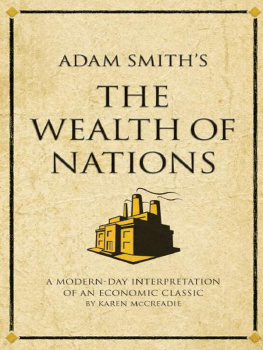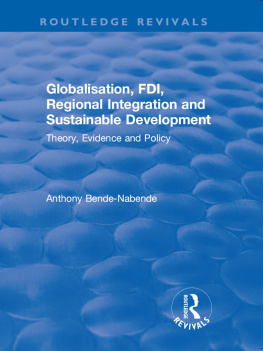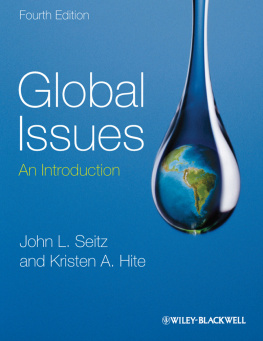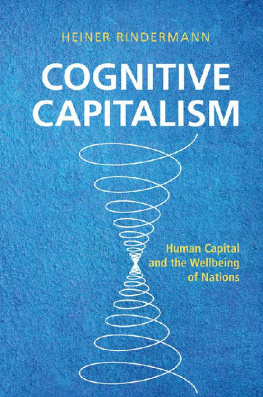Routledge Revivals
Modern World Development
Since the time of Adam Smith, there has been a voluminous literature concerned with the differing wealth of nations and the variation in the nature of economic growth, and several schools of thought have held precedence at different times. The fundamental mechanisms have been regarded by some as capital accumulation and investment, and by others as entrepreneurial ability.
Modern World Development, first published in 1982, shows that the length of time under consideration materially affects the relative significance assigned to the factors involved; similarly, the size of an area cannot be ignored. Through an examination of the major theories of economic growth, the role of natural resources, the core-periphery model of world development, environmental change and the concept of human capital, Professor Chisholm has written a stimulating and important book which will appeal to students of economics, history and geography.
Modern World Development
A Geographical Perspective
Michael Chisholm
First published in 1982
by Hutchinson & Co.
This edition first published in 2016 by Routledge
2 Park Square, Milton Park, Abingdon, Oxon, OX14 4RN
and by Routledge
711 Third Avenue, New York, NY 10017
Routledge is an imprint of the Taylor & Francis Group, an informa business
1982 Michael Chisholm
All rights reserved. No part of this book may be reprinted or reproduced or utilised in any form or by any electronic, mechanical, or other means, now known or hereafter invented, including photocopying and recording, or in any information storage or retrieval system, without permission in writing from the publishers.
Publishers Note
The publisher has gone to great lengths to ensure the quality of this reprint but points out that some imperfections in the original copies may be apparent.
Disclaimer
The publisher has made every effort to trace copyright holders and welcomes correspondence from those they have been unable to contact.
A Library of Congress record exists under LC control number: 82206753
ISBN 13: 978-1-138-92243-3 (hbk)
ISBN 13: 978-1-315-68582-3 (ebk)
Modern World Development
A geographical perspective
Michael Chisholm
Hutchinson & Co. (Publishers) Ltd
An imprint of the Hutchinson Publishing Group
17-21 Conway Street, London W1P 6JD
Hutchinson Group (Australia) Pty Ltd
30-32 Cremorne Street, Richmond South, Victoria 3121
PO Box 151, Broadway, New South Wales 2007
Hutchinson Group (NZ) Ltd
32-34 View Road, PO Box 40-086, Glenfield, Auckland 10
Hutchinson Group (SA) (Pty) Ltd
PO Box 337, Bergvlei 2012, South Africa
First published 1982
Michael Chisholm 1982
The paperback edition of this book is sold subject to the condition that it shall not, by way of trade or otherwise, be lent, resold, hired out or otherwise circulated without the publishers prior consent in any form of binding or cover other than that in which it is published and without a similar condition including this condition being imposed on the subsequent purchaser
Set in Times Roman by
Computape (Pickering) Ltd, North Yorkshire
Printed in Great Britain by The Anchor Press Ltd and bound by Wm Brendon & Son Ltd both of Tiptree, Essex
British Library Cataloguing in Publication Data
Chisholm, Michael
Modern world development.
1. Economic development
I. Title
330.9HD82
ISBN 0 09 141380 X cased
0 09 141381 8 paper
Contents
The immediate and tangible spur to think and read about the subject-matter of this book was provided by the honour of being elected Junior Vice-President of the Institute of British Geographers. With the inevitability of becoming President and having to prepare an address for delivery at Lancaster in January 1980, I wanted to choose a topic relevant for colleagues in both physical and human geography, the latter in both its historical and contemporary aspects. Furthermore, I wanted to discuss some real problems, some arenas of active research, rather than enter the hortatory lists to urge colleagues to follow one methodological example rather than another.
It seemed natural to start from my own long-standing interest in regional economic development. Considered on a global scale, patterns of growth and change involve a complex interplay of short-term and long-term problems, and also fascinating issues concerning the significance of natural environmental conditions in relation to the intervention of human agency. Also important is the relative significance of processes endogenous within a nation and the role of exogenous variables mediated through international trade, world financial institutions and other such mechanisms. Given the interdependence of the world economy, attention will be devoted to both the more advanced nations and to the less developed, though primarily in a two-fold context relevant for the less developed economies. One context is the nature of the lessons that can be learned from the experience of the worlds core nations which can be applied to the periphery. The other context is the nature of the impact of the core upon the periphery: has it been advantageous or disadvantageous for the peripheral nations?
The writing of this book was made possible by sabbatical leave granted by the University of Cambridge for the Michaelmas Term, 1980, for which I am very grateful. I am also grateful to Mr M. Young, Department of Geography, Cambridge, for drawing the majority of the illustrations.
Harston, Cambridge
September 1981
I do not know which makes a man more conservative to know nothing but the present, or nothing but the past. (Keynes, 1926)
Since the end of the second world war, the volume of literature that has been published concerning the empirical facts of economic growth and development, the concepts that are relevant in analysing the observed patterns, and in attempts to generate theories that will serve to illuminate what is, and what should be, has been vast. What, therefore, can the justification be for yet another book on the subject? Three possible reasons lie to hand, only one of which is relevant in the present context. The first would be to offer new data that had not previously been available, whether for a single region or country, or more generally on a global scale. Second, there might be new theories or concepts to discuss, of a kind that would illuminate existing factual knowledge and possibly lead either to a reinterpretation of the past or to new policy prescriptions for the present. This volume makes no claim to offer either of these. Instead, the justification lies in the third reason. In every generation, it is necessary to examine afresh the existing corpus of empirical knowledge and also the ideas which are current, and those which have been discarded as out-moded, to see whether present conventional attitudes are correct and, if so, to what extent and in what circumstances. The converse is to examine where conventional wisdom is lacking and needs rethinking. In this sense, therefore, the present book has the character of an extended essay in which I offer a viewpoint, grounded in both empirical reality and theories of development, which, I hope, provides a framework within which to think about the wealth and poverty of nations.















